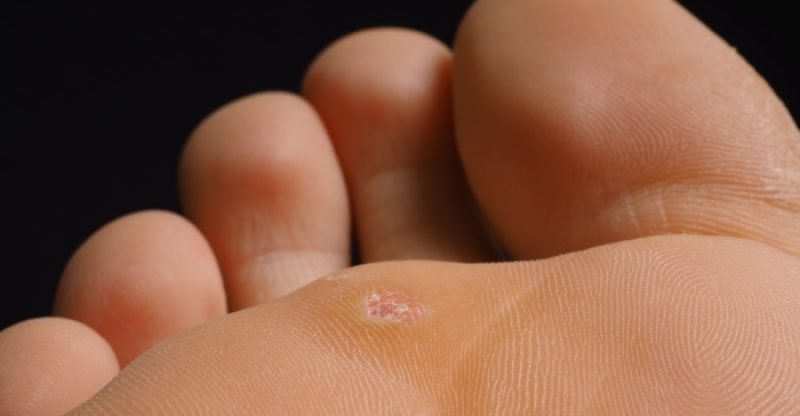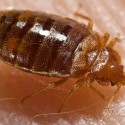14 Plantar Wart Natural and Conventional Treatments
Foot problems are not uncommon, and most of us have had calluses, blisters, and other issues that cause pain and discomfort.
If you’ve ever had a hard growth on the sole of your foot, chances are you have had a plantar wart.
These annoying growths usually appear on the weight-bearing parts of your feet, like the heels, and can cause pain and other problems.
If you have a plantar wart and want to treat it naturally, our guide will help you learn all the best remedies you can try at home.
While plantar warts sometimes resemble calluses and corns, they are distinctly different in their cause and treatment.
A viral infection causes plantar warts, and if left untreated, they can cause pain and discomfort while walking or standing.
Because a virus causes them, plantar warts are also easily spread from person to person.
That means getting rid of your plantar wart is not only essential for you, but for others with whom you have contact.
If you or someone with whom you live has a plantar wart, our guide can help you learn how to avoid spreading them, and how to treat them so that they no longer cause your symptoms.
We offer recommendations for the best natural treatments and help you understand how plantar warts develop.
Understanding Plantar Warts
Many soft tissue problems can impact different parts of your body.
The most common types of warts are plantar warts, flat warts, common warts, and genital warts.
A virus causes all of these, and each is common to different parts of the body.
If you have a wart on your foot’s sole, you have a plantar wart.
The hard, fleshy growths known as plantar warts appear on the heel or ball of your foot, where your foot bears the most weight and experiences the most friction and pressure.
Because they are under pressure, plantar warts may actually grow inward or be flat.
In this case, a callus will likely form over the wart due to the friction of walking.
You can have a single plantar wart, or they can grow in clusters, known as mosaic warts.
Because they grow slowly, they eventually lie deep under your skin, causing pain and discomfort, especially while you are walking or standing.
Plantar warts can cause burning, sharp pain in your feet.
Because your feet are so important for getting you around, you want them to be healthy and free from problems.
Taking care of a plantar wart is therefore essential when you start noticing symptoms.
When you have a wart that causes pain for extended periods of time, you may change the way you walk or stand.
Changing your posture or gait can have significant effects on your knees, hips, and other joints and muscles in your legs and back.
Causes of Plantar Warts
All warts are caused by the same virus, known as the human papillomavirus, or HPV.
The virus enters your body through the skin via abrasions or tiny cuts.
When it enters your body through your feet, plantar warts form (1).
You can get plantar warts from skin-to-skin contact, or by stepping on an infected area.
Communal showers are one of the most common locations for spreading plantar warts (2).
Another important note regarding HPV and warts.
You cannot spread warts or HPV from feet to genitals.
While they are the same virus, different strains affect various body parts.
The strain responsible for plantar warts is not the same as the one that causes genital warts (3).
Plantar Wart Risk Factors and How They Spread
Everyone is susceptible to contracting the virus that causes plantar warts.
Children and adolescents are particularly so because they share communal spaces and have frequent scrapes and cuts that allow the virus to enter through the skin.
If you have a compromised immune system, you are also more likely to get any kind of wart.
Certain medications, old age, and diseases such as HIV/AIDS are common immune suppressors (4).
Skin-to-skin contact is a standard method of transmission.
Coming into contact with an infected surface, such as a shower floor, towel, or bench can also spread the virus that causes warts.
Scratching your wart can spread the virus, as can skin you shed from the wart.
Because of this, protecting your feet in public places and in areas you share with someone with a plantar wart is, therefore, a vital step in preventing the spread of warts.
Symptoms of Plantar Warts
It is relatively easy to diagnose a plantar wart for yourself, so many people do not seek medical attention when they have one.
If you are unsure if your growth is a plantar wart or something else, though, your doctor can diagnose the problem with a simple exam.
Because of their location, plantar warts are the most common type of wart to cause symptoms.
Plantar warts cause pain similar to having a pebble in your shoe.
It can be easy to confuse them with a callus because they can look similar, but if you experience pain when squeezing the area, you have a plantar wart.
There may also be black dots on the surface, so if you see these, you can be sure you have a plantar wart.
The most common characteristics of a plantar wart are:
- Rough, grainy, fleshy skin on the sole of your foot;
- Thickened or hard skin over a specific area of your foot;
- Discomfort or pain while walking or standing;
- Wart seeds, which look like tiny black dots, on top of the painful area.
How to Prevent Plantar Warts
Wearing sandals in communal showers and not sharing towels or other objects with others can help prevent the spread of plantar warts and the HPV virus that causes them.
Plantar warts are generally easy to treat on your own, which is why home and natural remedies are essential information for anyone with a plantar wart.
If you have a plantar wart, you also need to change your socks and shoes daily, keep your feet dry and clean, and check your feet regularly for signs of new warts.
If you have children or adolescents, you should also check their feet regularly.
Always avoid contact with warts on any other part of your body or another person’s body (6).
Conventional Treatments for Plantar Warts
If left untreated, plantar warts will likely go away on their own, but this can take as long as two years.
Your immune system needs to fight off the infection causing the wart, and how long this takes depends on your body’s ability to do so.
Because warts can cause pain and discomfort, though, you likely will want to treat your wart rather than waiting for it to go away on its own.
Warts can also be embarrassing if others see them, so seeking treatments is common for most people with a plantar wart or any other type of wart.
There are several treatments you can try at home, as well as some you can try in conjunction with your physician.
The most common, traditional treatments include salicylic acid, freezing, over-the-counter medicines, laser treatment, and immune therapy (7).
Topical Treatments
Your doctor can prescribe a topical wart medication containing salicylic acid.
The acid removes the wart one layer at a time when applied regularly.
This treatment method is most effective when used in conjunction with cryotherapy or immune therapy.(8)
Cryotherapy and Acid Treatments
Cryotherapy involves freezing the wart using liquid nitrogen.
Freezing destroys the wart and the virus that causes it.
The freezing procedure creates a blister over the wart, and when the blister sloughs off, part or all of the wart will also peel away.
Cryotherapy usually requires multiple treatments to be effective.
This treatment can be painful and takes several weeks to be successful.
Shaving off the wart and applying bichloracetic acid or trichloroacetic acid is another option.
Like freezing, this process will need to be repeated several times to remove the wart fully.
Acid treatments cause stinging and burning.
Immune Therapy
Immune therapy is designed to support your immune system’s ability to fight the virus that causes warts.
Antigens, which stimulate the production of antibodies, are either injected or applied topically to the wart, and your body’s natural systems can then fight off the infection.
Immune therapy is growing in popularity, and various antigens are being tried to determine the most effective antigen for treating this type of wart (9).
Laser Surgery
Lasers can be used to remove warts.
Your doctor will use a laser to burn and destroy the tissue creating the wart.
Research indicates that this therapy is less effective than other, less invasive procedures (10).
Laser treatments can cause pain and lasting scars.
All conventional treatment methods for treating plantar warts come with side effects and possible risks.
Be sure that you understand these before opting for a treatment plan.
Natural treatments have fewer side effects and come with less risk, so selecting one of these may be a good starting point for treating your plantar wart on your own.
Here are our favorite natural remedies for treating your plantar warts.
Natural Treatments for Plantar Warts
If you have a robust immune system, your plantar wart may go away on its own after just a short time.
Boosting your immune system is therefore essential when trying to get rid of a plantar wart.
There are also ways to free your foot from the wart using ingredients you may already have, or that are readily available to you.
Boost Your Immunity
Making sure you are healthy and supporting a healthy immune system will help you heal this infection and rid yourself of plantar warts.
Because we are all exposed to fungi, bacteria, and viruses all the time, it is crucial that your immune system be as healthy as possible.
Used in combination with topical treatments, immune boosting can help your plantar wart heal more quickly.
Here are the most effective changes you can make to your diet to ensure your immune system is working at its greatest capacity.
- Eat a healthy diet with plenty of vegetables, fresh fruit, lean proteins, healthy fats, and high-fiber foods.
- Take a vitamin supplement that adds additional Vitamin A, Vitamin C, Vitamin E, and zinc to your daily intake.
- Eat plenty of foods that help your liver to function properly. Your liver helps detoxify your body, so when it’s working poorly, you are more susceptible to invaders. Good liver support comes from beets, turmeric, artichokes, milk thistle, and leafy greens.
- Licorice and lemon balm have natural antiviral properties. Look for tincture, tea, or glycerite forms of these herbs.
- Immune-boosting supplements you can take include elderberry and Echinacea.
Zinc
Taking a zinc supplement or using zinc ointment directly on the wart can boost your immunity and help fight the infection causing it.
Over-the-Counter Salicylic Acid
You can buy non-prescription-strength salicylic acid to use at home to treat your wart.
Apply the acid to your wart, covering it with a bandage to keep the medication from rubbing off.
Leave it for two days, clean the wart, then reapply the acid.
This treatment may take several months to work effectively.
Tea Tree Oil
Tea tree oil has powerful antimicrobial properties that can help get rid of your plantar wart.
Apply a few drops of the oil to your wart, then cover with a bandage.
If your skin is sensitive to the oil, you can mix it with a carrier oil, such as coconut oil.
Apply this daily before bed, and repeat each day for several months until the wart disappears.
Turmeric
Turmeric is a powerful antioxidant and can be very effective at treating plantar warts.
Many have found success with turmeric where other remedies have failed.
Turmeric is used to treat many skin problems, and its healing powers can also prevent scarring once the wart is healed (11).
To use turmeric as a treatment, mix one to two teaspoons of turmeric powder with water to create a thick paste.
Apply this directly to your plantar wart, and allow it to dry for 30 minutes.
Rinse the area with warm water.
If your skin turns yellow from the spice, you can rub a lemon wedge on the area to remove the stain.
Repeat this three times a day until the wart disappears.
Aloe Vera
In addition to being a natural anti-inflammatory, aloe vera’s skin-healing properties make it an excellent choice for plantar wart treatment.
The moisturizing powers of aloe vera will help remove the outer layer of skin from your wart, helping it to go away faster.
Take a fresh leaf from the aloe plant and split it down the middle.
Be sure the piece you cut is big enough to cover your wart.
Place the piece of the leaf against your wart, cover with a small bandage, then wrap your foot in an elastic bandage overnight.
This will keep the leaf in place while you sleep.
Remove it the next morning, cleaning the entire area and applying more aloe vera gel before putting on your socks and shoes.
Repeat this daily until the wart disappears.
Apple Cider Vinegar
You can use this mild acid to treat your plantar wart at home.
Apple cider vinegar also has antiviral properties, which will help treat the cause of the wart.
To use, dilute unfiltered apple cider vinegar using equal parts water and vinegar.
Use the mixture to soak a cotton ball, then apply this to the wart.
Cover it with duct tape.
Replace the cotton ball and tape every two days until the wart disappears, usually after several weeks.
Garlic
Garlic’s natural properties make it a good candidate for treating a plantar wart.
Slice fresh, raw garlic into thin sheets, and place these slices over the wart to cover it.
Cover with a bandage before bed. Repeat for several weeks until the wart heals.
Duct Tape
Duct tape has been used to treat plantar warts successfully.
Cover the wart with duct tape and leave it on for six days.
Remove the tape and soak the area in warm water, rubbing the wart. Allow the foot to dry for twelve hours, then reapply tape.
Continue this process for up to two months until the wart disappears.
Vitamin C
Create a paste using garlic oil and vitamin C powder by mixing one part oil to two parts powder.
Apply this to your wart and cover with a bandage before bed.
Repeat this for several months until the wart heals.
Precautions
Treating plantar warts effectively is safe and easy to do at home.
While some people appear to be immune to warts, once you contract the virus that causes them, it can be difficult to rid your body of it completely.
Once you treat a wart, it can come back in the same or a nearby location.
Preventing the spread of the virus that causes plantar warts is the most effective treatment for them.
Regardless of which type of treatment you select and whether it is natural or conventional, diligence will be necessary for treating warts to ensure that they are fully healed.
You have to eradicate the virus if you want to guarantee that your wart will not come back.
If you opt for using duct tape to treat your wart, be sure not to cover too much healthy skin.
This tape can cause irritation and form blisters where the tape rubs against your skin as you walk, and so this treatment should be used with caution if you are active or walk a lot.
Do not attempt to cut your wart off yourself, as doing so can lead to infection and serious complications, such as bleeding and the spread of the HPV virus.
Natural treatments such as those described in our guide are more helpful and less damaging than removing the wart yourself; do not attempt this risky method.
If you have tried natural treatments and your wart is not disappearing or continues to come back after treatment, it may be time to seek medical help.
Remember, though, that most warts will heal on their own, so patience can often be the most effective strategy for treating plantar warts.
Making your immune system healthy and strong is a great first defense for preventing plantar warts from forming, as is wearing shoes in public places and not sharing objects with those infected with the HPV virus that causes warts.
Preventing the wart from forming is preferable to treating it once it occurs, so exercise care and common sense to stop warts from happening.
Effective natural treatments for plantar warts include apple cider vinegar, aloe vera, turmeric, duct tape, tea tree oil, garlic, and zinc.
Eating a healthy diet is also a great way to boost your immune system to fight the infection that causes plantar warts.
Treating plantar warts naturally is a safe and effective alternative to conventional treatments.
FDA Compliance
The information on this website has not been evaluated by the Food & Drug Administration or any other medical body. We do not aim to diagnose, treat, cure or prevent any illness or disease. Information is shared for educational purposes only. You must consult your doctor before acting on any content on this website, especially if you are pregnant, nursing, taking medication, or have a medical condition.
HOW WOULD YOU RATE THIS ARTICLE?






Great article! These are the best treatments for getting rid of plantar warts. I really like this article. Thnks a lot for sharing.